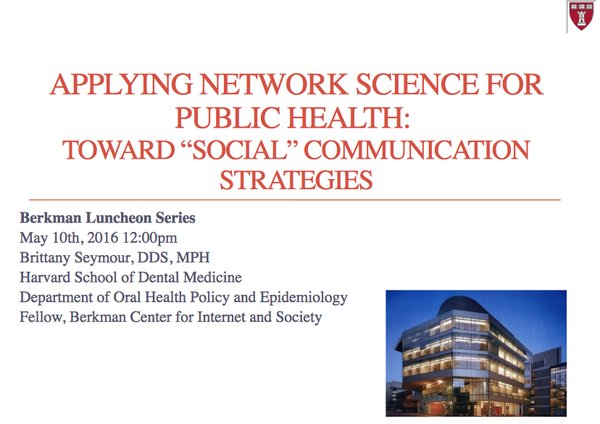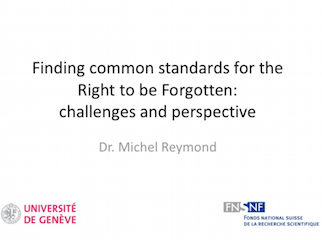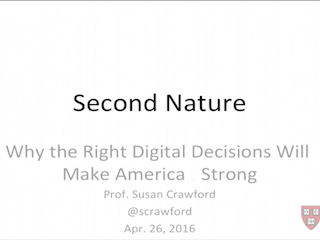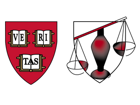The social nature of today’s Internet is creating new public health and policy challenges. For example, the US in 2014 experienced the largest measles outbreak in nearly a generation, which led to the passing of the nation’s most conservative vaccine legislation, eliminating the personal belief exemption in California. Research has identified online misinformation about vaccines as one of the risk factors for this outbreak.
In this talk, Dr. Brittany Seymour — Assistant Professor at Harvard School of Dental Medicine and Berkman Fellow — examines three big data case analyses (water fluoridation, the Ebola epidemic, and childhood vaccinations) to explore ways to employ network science to develop social communication strategies for public health that using the power of the Internet.

Also in ogg for download
More on this event here
May 10th, 2016
The social nature of today’s Internet is creating new public health and policy challenges. For example, the US in 2014 experienced the largest measles outbreak in nearly a generation, which led to the passing of the nation’s most conservative vaccine legislation, eliminating the personal belief exemption in California. Research has identified online misinformation about vaccines as one of the risk factors for this outbreak.
In this talk, Dr. Brittany Seymour — Assistant Professor at Harvard School of Dental Medicine and Berkman Fellow — examines three big data case analyses (water fluoridation, the Ebola epidemic, and childhood vaccinations) to explore ways to employ network science to develop social communication strategies for public health that using the power of the Internet.
 Download the MP3
Download the MP3
…or download the OGG audio format!
More on this event here
May 10th, 2016
Following the 2014 Google Spain decision rendered by the European Court of Justice of the European Union, search engines – and, first among them, Google – are tasked with the delisting of search results leading to outdated or inaccurate information about European citizens. This ‘right to be delisted’ has since then revealed itself as a highly controversial concept, raising issues such as the desired degree of protection of personal data over the Internet and the role of the act of forgetting in the digital age; it also highlighted the lack of an existing consensus over these questions between individual jurisdictions – and namely between the European Union and the United States.
On 14 April 2016, the European Parliament has adopted the General Data Protection Regulation, which will, in two years from now, update and harmonize data protection law all across the Member States of the European Union. Its article 17 contains a ‘right to erasure’ or a ‘right to be forgotten’ which is set to formalize, unify and extend the existing Google Spain ruling.
But how to make that happen in practice? How can legal fragmentation be prevented? Relying on his background in conflict of laws, Dr. Michel Reymond shows that finding common standards for the Right to be Forgotten will prove extremely difficult – not only regarding its procedural elements, but also when addressing its substance. He also argues that, before even starting a conversation between the U.S. and the E.U., some soul-searching about the nature of the right may need to be performed inside the E.U. itself first.
About Michel
Dr. Michel J. Reymond is currently a visiting researcher at the Berkman Center for Internet & Society under a stipend from the Swiss National Foundation. With a background in private international law and comparative law at the University of Geneva, his work is mainly centered on the relationship between regulation, competing legal orders, and the Internet. His PhD thesis, which was developed alongside Prof. Thomas Kadner Graziano, focused on defamation on the Internet in private international law. More recently, his topics of research have included wider issues about Internet regulation, and in particular the “right to be forgotten” decision by the European Court of Justice. Having served as assistant for 3 years at his home university, Michel J. Reymond is also dedicated to teaching and has notably coached local students for the Vienna Moot Court Competition.

Also in ogg for download
More on this event here
May 4th, 2016
Following the 2014 Google Spain decision rendered by the European Court of Justice of the European Union, search engines – and, first among them, Google – are tasked with the delisting of search results leading to outdated or inaccurate information about European citizens. This ‘right to be delisted’ has since then revealed itself as a highly controversial concept, raising issues such as the desired degree of protection of personal data over the Internet and the role of the act of forgetting in the digital age; it also highlighted the lack of an existing consensus over these questions between individual jurisdictions – and namely between the European Union and the United States.
On 14 April 2016, the European Parliament has adopted the General Data Protection Regulation, which will, in two years from now, update and harmonize data protection law all across the Member States of the European Union. Its article 17 contains a ‘right to erasure’ or a ‘right to be forgotten’ which is set to formalize, unify and extend the existing Google Spain ruling.
But how to make that happen in practice? How can legal fragmentation be prevented? Relying on his background in conflict of laws, Dr. Michel Reymond shows that finding common standards for the Right to be Forgotten will prove extremely difficult – not only regarding its procedural elements, but also when addressing its substance. He also argues that, before even starting a conversation between the U.S. and the E.U., some soul-searching about the nature of the right may need to be performed inside the E.U. itself first.
About Michel
Dr. Michel J. Reymond is currently a visiting researcher at the Berkman Center for Internet & Society under a stipend from the Swiss National Foundation. With a background in private international law and comparative law at the University of Geneva, his work is mainly centered on the relationship between regulation, competing legal orders, and the Internet. His PhD thesis, which was developed alongside Prof. Thomas Kadner Graziano, focused on defamation on the Internet in private international law. More recently, his topics of research have included wider issues about Internet regulation, and in particular the “right to be forgotten” decision by the European Court of Justice. Having served as assistant for 3 years at his home university, Michel J. Reymond is also dedicated to teaching and has notably coached local students for the Vienna Moot Court Competition.
 Download the MP3
Download the MP3
…or download the OGG audio format!
More on this event here
May 4th, 2016
Carl Williams joins us to speak about the current Black Liberation movement. What and who it is, how it started, and how Twitter, Facebook (yes, Facebook) and other social media played a part.
About Carl
Carl joined the ACLU of Massachusetts as staff attorney in September 2013. He was previously a criminal defense attorney with the Roxbury Defenders Unit of the Committee for Public Counsel Services. Carl is a graduate of the University of Rhode Island and the University of Wisconsin Law School.
A long-time resident of Boston’s Roxbury neighborhood, he has been an activist and organizer on issues of war, immigrants’ rights, LGBTQ rights, racial justice and Palestinian self-determination. Carl is a member of the National Lawyers Guild and has served on its Massachusetts board of directors. During the Occupy Boston movement he was part of its legal defense and support team, which provided nearly 24-hour support to the participants.
More recently, Carl was a Givelber Distinguished Lecturer on Public Interest Law at Northeastern University School of Law, where he taught a class on social justice movements and the law.

Also in ogg for download
More on this event here
May 3rd, 2016
Carl Williams joins us to speak about the current Black Liberation movement. What and who it is, how it started, and how Twitter, Facebook (yes, Facebook) and other social media played a part.
About Carl
Carl joined the ACLU of Massachusetts as staff attorney in September 2013. He was previously a criminal defense attorney with the Roxbury Defenders Unit of the Committee for Public Counsel Services. Carl is a graduate of the University of Rhode Island and the University of Wisconsin Law School.
A long-time resident of Boston’s Roxbury neighborhood, he has been an activist and organizer on issues of war, immigrants’ rights, LGBTQ rights, racial justice and Palestinian self-determination. Carl is a member of the National Lawyers Guild and has served on its Massachusetts board of directors. During the Occupy Boston movement he was part of its legal defense and support team, which provided nearly 24-hour support to the participants.
More recently, Carl was a Givelber Distinguished Lecturer on Public Interest Law at Northeastern University School of Law, where he taught a class on social justice movements and the law.
 Download the MP3
Download the MP3
…or download the OGG audio format!
More on this event here
May 3rd, 2016
 Listen:or download | …also in Ogg
Listen:or download | …also in Ogg
“George Lucas built a whole new industry with Star Wars.” says Peter S. Menell, devoted science fiction fan and a professor at the UC Berkeley School of Law, who studies copyright and intellectual property law. “But what funds that remarkable company is their ways of using copyright.”
And he’s right. A third of the profits LucasFilm pulls in from Star Wars has come from merchandising alone. Not ticket sales, not DVDs, not video games or books. Toys, clothes, and weird tie-ins like tauntaun sleeping bags and wookie hair conditioner.
But fans of Star Wars, and other stratospherically profitable creative universes, increasingly like to become creators within those universes. They write books, they make costumes, they direct spinoffs and upload them to YouTube.
And sometimes they make money.
How does law come into play when fans start to reinterpret intellectual property? We sat down with Menell to see where the tensions lie between the law, the courts, and the George Lucases of the world.
Reference Section
Creative Commons music used in this episode:
David Szesztay “Morning One”
Broke For Free “Something Elated”
Image courtesy of Flickr user: kalexanderson
Tweet us! Subscribe to us on Soundcloud, iTunes, or RSS.
May 2nd, 2016
The U.S. still lags behind much of the developed world in terms of the speed and density of its internet infrastructure. In the 21st Century this disparity in access to high speed internet could stand as a critical challenge to competitiveness in many areas, from industry and commerce, to healthcare and education, to civic life and culture.
In this conversation, Susan Crawford — John A. Reilly Clinical Professor of Law at Harvard Law School and a co-director of the Berkman Center — discusses the potential futures we face as we consider how to invest in the wires that bring us our internet.

Also in ogg for download
More on this event here
April 28th, 2016
The U.S. still lags behind much of the developed world in terms of the speed and density of its internet infrastructure. In the 21st Century this disparity in access to high speed internet could stand as a critical challenge to competitiveness in many areas, from industry and commerce, to healthcare and education, to civic life and culture.
In this conversation, Susan Crawford — John A. Reilly Clinical Professor of Law at Harvard Law School and a co-director of the Berkman Center — discusses the potential futures we face as we consider how to invest in the wires that bring us our internet.
 Download the MP3
Download the MP3
…or download the OGG audio format!
More on this event here
April 28th, 2016
With Internet censorship and mass surveillance on the rise globally, understanding regulatory “chilling effects” — the idea that laws, regulations, or state surveillance can deter people from exercising their freedoms or engaging in entirely legal activities — has thus today, in our Post-Snowden world, taken on greater urgency and public importance.
In this talk, Jon Penney — doctoral candidate at the Oxford Internet Institute, University of Oxford (Balliol College), and a research fellow at the Citizen Lab, Munk School of Global Affairs, University of Toronto — fills in some of the gaps in our understanding of chilling effects online. Through discussion of three empirical legal case studies — one on surveillance-related chilling effects and Wikipedia, a second on the impact of the DMCA’s copyright enforcement scheme, and a third survey-based study on “chilling effect scenarios” — Jon offers insights into the nature and scale of regulatory chilling effects online.

Also in ogg for download
More on this event here
April 28th, 2016
Next Posts
Previous Posts



 Listen:
Listen:


